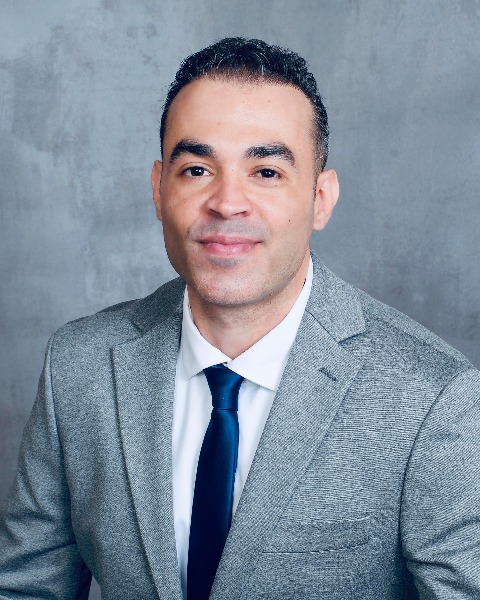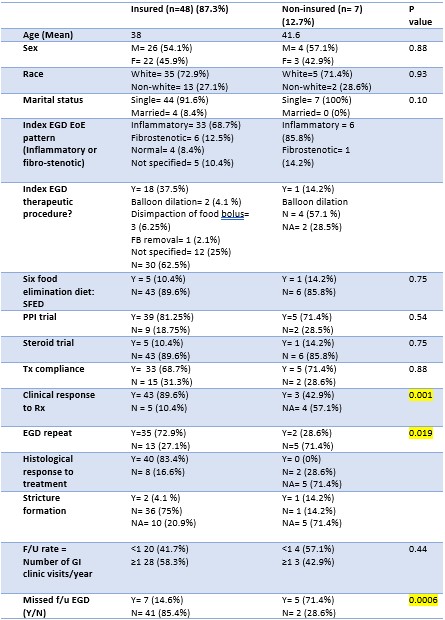Monday Poster Session
Category: Esophagus
P2789 - Underinsured, Undermonitored, Undermined: Real-World Data on EoE Disparities
Monday, October 27, 2025
10:30 AM - 4:00 PM PDT
Location: Exhibit Hall

Wael T. Mohamed, MD (he/him/his)
University of Kansas School of Medicine
Wichita, KS
Presenting Author(s)
Wael T. Mohamed, MD1, Hassan Ghoz, MD2
1University of Kansas School of Medicine, Wichita, KS; 2University of Missouri Kansas City School of Medicine, Kansas City, MO
Introduction: Eosinophilic Esophagitis (EoE) is a chronic immune-mediated esophageal disorder with rising incidence in the United States. Optimal management relies on timely clinical evaluations and endoscopic monitoring to assess both clinical and histological remission. Given the potential disparities in healthcare access, we hypothesized that insurance status may significantly influence treatment outcomes in patients with EoE.
Methods: A retrospective chart review was conducted on patients diagnosed with EoE at a tertiary care center between January 2016 and December 2021. Patients were stratified based on insurance status into insured and uninsured groups. Demographic variables, treatment response, follow-up adherence, and histological outcomes were compared. Statistical analyses included chi-square or Fisher's exact tests for categorical variables and t-tests for continuous variables.
Results: Fifty-five patients were included; 48 (87.3%) were insured, and 7 (12.7%) were uninsured. There were no significant differences in baseline demographics. Clinical improvement was reported in 89.6% of insured patients compared to 42.9% in the uninsured group (P < 0.001). Repeat esophagogastroduodenoscopy (EGD) was performed in 72.9% of insured versus 28.6% of uninsured patients (P = 0.019). Histologic remission was achieved in 83.4% of insured patients versus none in the uninsured group. Missed gastroenterology follow-up appointments were numerically higher in the uninsured group (57.1% vs. 41.7%, P = 0.44), though this was not statistically significant.
Discussion: Our findings suggest that insurance status is a critical determinant of clinical, endoscopic, and histologic outcomes in patients with EoE. Uninsured patients were significantly less likely to undergo follow-up endoscopies, achieve symptom improvement, or reach histologic remission. These results highlight the need for improved access to care and structured follow-up in underserved populations with EoE.

Figure: INSURANCE STATUS CAN ADVERSELY AFFECT TREATMENT OUTCOMES IN PATIENTS WITH EOSINOPHILIC ESOPHAGITIS
Disclosures:
Wael Mohamed indicated no relevant financial relationships.
Hassan Ghoz indicated no relevant financial relationships.
Wael T. Mohamed, MD1, Hassan Ghoz, MD2. P2789 - Underinsured, Undermonitored, Undermined: Real-World Data on EoE Disparities, ACG 2025 Annual Scientific Meeting Abstracts. Phoenix, AZ: American College of Gastroenterology.
1University of Kansas School of Medicine, Wichita, KS; 2University of Missouri Kansas City School of Medicine, Kansas City, MO
Introduction: Eosinophilic Esophagitis (EoE) is a chronic immune-mediated esophageal disorder with rising incidence in the United States. Optimal management relies on timely clinical evaluations and endoscopic monitoring to assess both clinical and histological remission. Given the potential disparities in healthcare access, we hypothesized that insurance status may significantly influence treatment outcomes in patients with EoE.
Methods: A retrospective chart review was conducted on patients diagnosed with EoE at a tertiary care center between January 2016 and December 2021. Patients were stratified based on insurance status into insured and uninsured groups. Demographic variables, treatment response, follow-up adherence, and histological outcomes were compared. Statistical analyses included chi-square or Fisher's exact tests for categorical variables and t-tests for continuous variables.
Results: Fifty-five patients were included; 48 (87.3%) were insured, and 7 (12.7%) were uninsured. There were no significant differences in baseline demographics. Clinical improvement was reported in 89.6% of insured patients compared to 42.9% in the uninsured group (P < 0.001). Repeat esophagogastroduodenoscopy (EGD) was performed in 72.9% of insured versus 28.6% of uninsured patients (P = 0.019). Histologic remission was achieved in 83.4% of insured patients versus none in the uninsured group. Missed gastroenterology follow-up appointments were numerically higher in the uninsured group (57.1% vs. 41.7%, P = 0.44), though this was not statistically significant.
Discussion: Our findings suggest that insurance status is a critical determinant of clinical, endoscopic, and histologic outcomes in patients with EoE. Uninsured patients were significantly less likely to undergo follow-up endoscopies, achieve symptom improvement, or reach histologic remission. These results highlight the need for improved access to care and structured follow-up in underserved populations with EoE.

Figure: INSURANCE STATUS CAN ADVERSELY AFFECT TREATMENT OUTCOMES IN PATIENTS WITH EOSINOPHILIC ESOPHAGITIS
Disclosures:
Wael Mohamed indicated no relevant financial relationships.
Hassan Ghoz indicated no relevant financial relationships.
Wael T. Mohamed, MD1, Hassan Ghoz, MD2. P2789 - Underinsured, Undermonitored, Undermined: Real-World Data on EoE Disparities, ACG 2025 Annual Scientific Meeting Abstracts. Phoenix, AZ: American College of Gastroenterology.
